‘Politics of hate’ fuelling religion-based majoritarianism across South Asia, writers warn
Sign up now: Get insights on Asia's fast-moving developments

Members of the All India Students Association protesting against the alleged atrocities on Muslims and cow-vigilantism, in New Delhi on Feb 24.
PHOTO: AFP
Follow topic:
WASHINGTON - The world should be worried about religious majoritarianism across South Asia, fuelled by the politics of hate, as it raises questions about the strength of democracy and nation states, says Pakistani-American writer Farahnaz Ispahani.
Across the region, the idea that the majority feel a sense of grievance or that they are under threat, or will soon be threatened – by even a small minority – and must therefore assert themselves, has strengthened and taken the form of right-wing religion-based majoritarianism.
“You have gradations (of religion-based majoritarianism) all over South Asia,” said Ms Ispahani, a former member of Pakistan’s Parliament and currently a senior fellow at the Religious Freedom Institute in Washington.
“But why do we care about South Asia? It is two billion people. It’s an important part of the world. Some of it is sinking and some is swimming to the top. So it’s a part of the world that more people need to really pay attention to,” she noted.
Ms Ispahani was speaking to The Straits Times in its latest Asian Insider video and podcast, alongside Mr Salil Tripathi, author and member of the board of PEN International, which promotes literature and defends freedom of expression.
Ms Ispahani is the editor of a new book from HarperCollins India, titled Politics Of Hate: Religious Majoritarianism In South Asia. It contains 11 essays on India, Pakistan, Bangladesh and Sri Lanka.
The biggest danger that she sees in South Asia is the conflation of religion and the state.
“What we (in South Asia) have always worked towards in a democratic framework is the separation of church and state,” she said.
But instilling fear in the majority and the othering – in extreme cases, the objectification or dehumanising of minorities – threatens that separation.
“I think possibly every single religion belief system belongs in India, probably more than in any country in the world. So why all of a sudden is there fear – fear of Muslims and Christians, fear of love jihad, fear of Muslims spreading Covid-19, hate groups, and trolling on the media,” she said.
“Love jihad” is a widely used conspiracy theory in India that contends that Muslim men lure Hindu women into marriage in order to convert them.
Ms Ispahani said: “All of these things have come about because the religious right and the political right have come together, even though they’re the majority, to make the majority feel they’re under threat from the minority.
“And there’s an old British saying, ‘Let the majority has its way, but let the minority has its say’. And what we are seeing all over South Asia today is the minority is not being allowed to have its say.”
The problems resulting from religious majoritarianism are not just social issues, she said. “These are issues that determine the strength and longevity of nations, and democracy is in danger.”
Mr Tripathi said liberal Pakistanis used to look up to India for its democratic roots and tradition, but that has changed.
Certainly, the majoritarianism agenda is still contested in India, he added.
“There is liberal opposition to what’s going on in India,” Mr Tripathi said, but “it’s just that the levers of the state and the cooperation of the media, of the judiciary, of the bureaucracy, and even of the defence forces, is so strong”.
On the role of the media, he said: “If you have plurality of voices, it’s not a problem. I think what’s happening in India, increasingly, is that one kind of voice comes out; yes, there are 25 channels, but they’re saying essentially the same message. Similarly with print media.”
“So what you’re left with are independent journalists, but they write for small portals and websites, and appeal tends to be limited. So that is a danger for India,” he said, noting that India’s press freedom ranking has been falling.
“Freedom of speech in India used to be the jewel,” Mr Tripathi said, citing the words of Mr Edward Behr, the late former Newsweek editor.
“And to go from the top 10 or 20, to 142 in the (2021 Reporters Without Borders) ranking, is a steep fall.”


